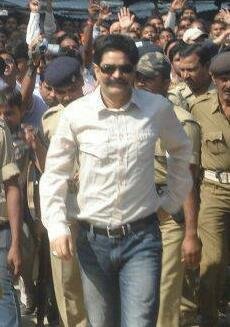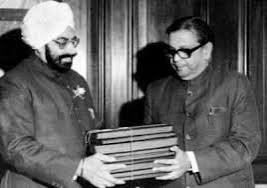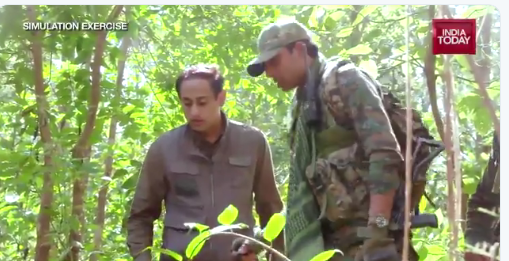Criminalisation of politics in Bihar
*C P Jha examines its roots for this special report.
The criminalisation of politics in Bihar started almost immediately after it was carved out from Bengal presidency in the British Raj of India. The Bengal presidency was divided twice on religious lines between 1905 and 1915.
After Bihar became a separate state with 31 districts, the criminalisation of politics steadily increased. The rule of Rashtriya Janata Dal (RJD) leader Lalu Prasad Yadav’s government witnessed protection to notorious criminals like Mohammad Shahabuddin of Sivan district, accused in the killing of Jawaharlal Nehru University (JNU) students’ union leader Chandrashekar Prasad in March 1997 (and journalist Rajdeo Ranjan in 2016. Violence before, during and after elections in Bihar is almost a norm ever since.

Mohammad Shahabuddin. Image Credit: Wikimedia
Abject poverty and unemployment
What is the reason for this criminalisation?
The abject poverty and unemployment in Bihar, with no real land reforms, spawned intense “class war” in several parts of this state, particularly in Bhojpur district and areas adjoining river Ganges and various tributaries of river Koshi. The armed class war in Bhojpur in the1970s was a reflection of the sharp divisions and deprivations in society.
Of course, the term “caste war” is more popularly used by those who fail to understand the nature of this “class war” in Bihar. While those engaged in these class wars are from the suppressed castes who form the Other Backward Classes (OBCs) that came to fore after the implementation of Bindeshwari Prasad Mandal Commission for reservation of jobs in government services, society in Bihar is still under control of the upper castes: Brahmins, Rajputs and Bhumihars.

B.P Mandal submitting the report of the second Backward Classes commission to the then President Giani Zail Singh. Image Credit: By ShyamRay011/Wikimedia
Gun happy
Do journalists of today know that, before any election, people who possess licensed firearms are required to deposit them to their nearest police station?
In Bihar, this rule is not enforced effectively. An arms factory manufactures guns in Munger but arms are easily available across the state. Criminal elements snatch licensed guns from security forces and there is a flourishing illegal arms trade. Barely a week ago, the National Investigation Agency (NIA) revealed that “several of the looted arms in Manipur had found their destination in poll-bound Bihar”.
Earlier, on October 14, police had proclaimed that its ‘Operation Jakheera’ had successfully nabbed ten criminals in Patna and seized their weapons. But how effective is the police in curbing violent activity?
On October 30, barely six days before the forthcoming Assembly elections in Bihar, Dular Chand Yadav, a history sheeter and supporter of Prashant Kishore Pandey’s Jan Suraj Party was killed in Mokama allegedly by gang members of another history sheeter, Anant Singh, close to Bihar’s Chief Minister Nitish Kumar’s party Janata Dal (United). Following this murder, people came onto the roads to protest against lawlessness and demand effective action, blocking the roads for two days.
The incident indicates that even the Jan Suraj Party does not lag behind in the spread of violence. While Prime Minister Narendra Modi said “jungle raaj’ would end in Bihar, Dipankar Bhattacharya, General Secretary of Communist Party of India M-L (Liberation) group described Bihar as the state where ‘bulldozer and criminal jaj’ will prevail if the NDA alliance would return to power.
Indeed, criminalisation has struck deep roots, aided by the economic deprivation in the state, coupled with poverty and unemployment. But will the forthcoming elections change anything? Hardly, if we go by the report of the Association for Democratic Reforms (ADR) and Bihar Election Watch, released on October 28 2025, two days before the Dular Chand killing. The report pointed out the growing issue of criminalisation in politics and said that major political parties had given tickets to candidates facing serious criminal charges.
The ADR analysis revealed that 423 affidavits of the total affidavits filed by 1,303 out of 1,314 candidates have criminal cases registered against them: a staggering one in three candidates. Charges range from murder, attempted murder and crimes against women, including rape.
Rashtriya Janata Dal (RJD) leads the list of candidates with criminal cases, with 53 out of 70 candidates (76%). The BJP has 31 out of 48 (65%), the Indian National Congress (INC) has 15 out of 23 (65%) candidates, Lok Janshakti Party (Ram Vilas) reported 7 of 13 (54%), and the Janata Dal (United) [JD(U)] has 22 of 57 (39%) candidates with criminal records.
The smaller parties also had candidates with criminal cases. The Aam Aadmi Party (AAP) has 12 of 44 (27%) candidates, the Bahujan Samaj Party (BSP) has 18 of 89 (20%). All five candidates from the Communist Party of India (CPI) and the Communist Party of India (Marxist) [CPI(M)] have criminal cases against them.
Despite the extreme poverty in the state, at least 40 percent of the candidates declared incomes of over a crore. How the ballot will be cast in this atmosphere of criminalized polity remains to be seen.
(*Senior journalist CP Jha has covered politics, literature and society for newspapers and news agencies for over five decades. He is based in a village in Saharsa district of Bihar).
Read our special features:
The “Deletion” of Independent Journalism: Bihar’s Free Speech Record, November ‘20-’25 (An FSC Report)
Wanted: A Responsible Media in Bihar, by Kiran Shaheen
Related



Commentaries